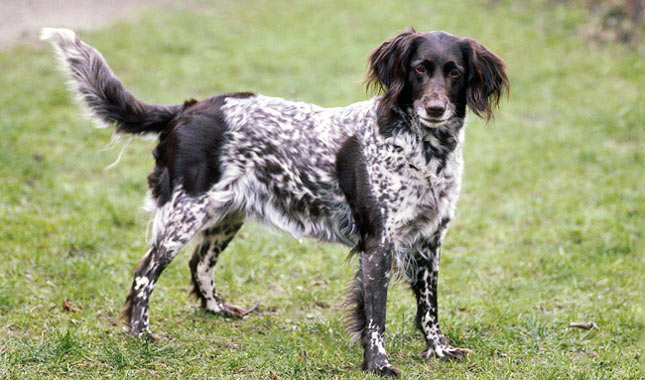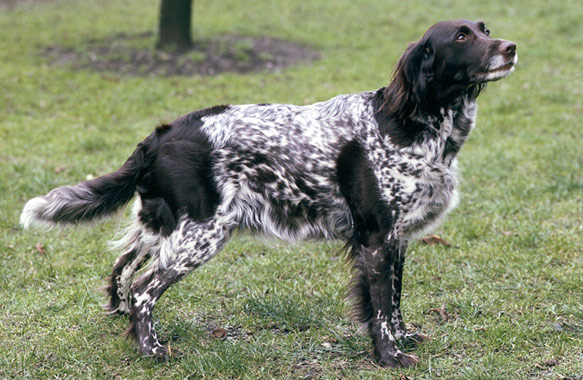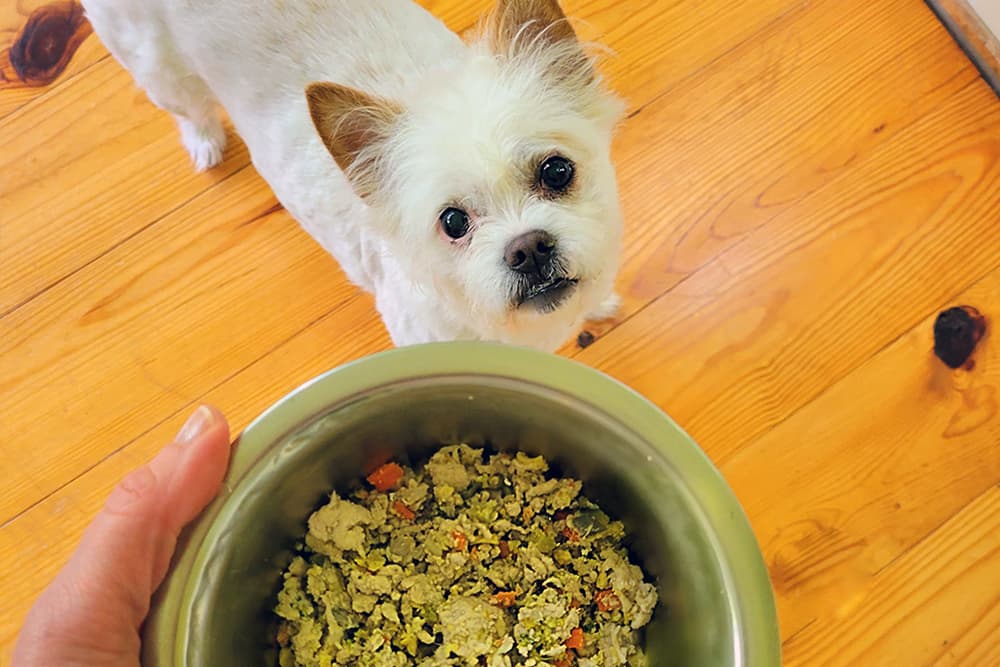Small Munsterlander
Published on June 24, 2011
Breed Details
- Height: 19 to 22 inches at the shoulder
- Weight: 35 to 60 pounds
Breed Characteristics
Adaptability
Trainability
Grooming
Apartament Friendly
Child Friendly
Shedding Level
Dog Friendly
Exercise Needs
Territorial
Barking Tendencies
Health Issues
Social Needs
Energy Level
Affectionate
Watchdog Instincts
Cat Friendly
Intelligence
Stranger Friendly
New to the United States, the Small Munsterlander has been a favorite in Europe for decades. The breed has a strong natural hunting instinct and high endurance, even in rough terrain and wet or cold conditions. Hunting is so vital to this dog’s happiness that many Small Munsterlander breeders will place their pups only in hunting homes. If you can take him out on hunting trips and provide him with a large fenced yard and plenty of daily exercise, he can be a cheerful, friendly, gentle family companion.
Gentle handling with positive reinforcement works best for the highly trainable Small Munsterlander. Attempt to force him or treat him unfairly and you’ll be rewarded with stubborn resistance.
He does require a bit of grooming. His coat needs frequent combing to prevent or remove mats and tangles, especially when he has been out in the field or hiking with you. A bath every six weeks or so is a good idea. In addition, he needs routine care, like nail trims, teeth brushing, and keeping the ears clean and dry.
A people-loving dog like the Small Munsterlander should live in the house. Banish him to the backyard with little or no human companionship and he’s a very unhappy camper.
Other Quick Facts
- The Small Munsterlander’s medium-length coat is thick and wavy, with feathering on the chest, back legs, and tail. The coat can be chestnut and white with dark patches and speckling or a roan pattern.
- The Small Munsterlander has a tremendous sense of smell, which serves him when he’s tracking.
- Small Munsterlanders are versatile hunting dogs used on upland game and waterfowl. Some even blood-track large game.
The History of Small Munsterlanders
This breed takes its name from the town of Munster, Germany, where it was created in the late 19th century by crossing German Longhaired Pointers with Wachtelhunds, which were Longhaired Spaniels. The goal was to breed an outstanding multipurpose dog that could not only point but also track wounded or dead game.
Like so many breeds, the Small Munsterlander nearly disappeared during World War II because of food shortages, but the breed was revived in its homeland. From there, the dogs spread to other countries, where they were prized for their small size, hunting abilities, and family-friendly nature. In the United States, the Small Munsterlander Club of North America is helping guide the breed’s development here. The United Kennel Club recognized the breed in 2006.
Small Munsterlander Temperament and Personality
The Small Munsterlander is self-confident and adaptable. Although he’s best suited to a hunting home, the mild-mannered and good-natured dog is highly affectionate and makes a great family companion. First, though, you have to teach him not to jump up, unless you just want him to greet everyone with a big kiss. He can be good with kids who are big enough to stand up to his exuberance. The dogs are quiet at home, happy to join you on the sofa after a good day’s hunting.
Outdoors, they can run for hours. They need plenty of daily exercise, as well as the chance to express and develop their strong instincts to track, point, and retrieve. If you live with a Small Munsterlander, challenge his brain with stimulating games, training, and puzzle toys.
Train him with a light touch. This gentle dog is highly intelligent and learns quickly. Unlike many hunting breeds, he remembers what he learns and is able to carry his knowledge over from season to season.
Start training your puppy the day you bring him home. Even at 7 or 8 weeks old, he is capable of soaking up everything you can teach him. Do not wait until he is 6 months old to begin training or you will have a bigger, more headstrong dog to deal with.
If possible, get him into puppy kindergarten class by the time he is 10 to 12 weeks old, and socialize, socialize, socialize. However, be aware that many puppy training classes require certain vaccines (like kennel cough) to be up to date, and many veterinarians recommend limited exposure to other dogs and public places until puppy vaccines (including rabies, distemper and parvovirus) have been completed. In lieu of formal training, you can begin training your puppy at home and socializing him among family and friends until puppy vaccines are completed.
What You Need to Know About Small Munsterlander Health
All dogs have the potential to develop genetic health problems, just as all people have the potential to inherit a particular disease. Run, don’t walk, from any breeder who does not offer a health guarantee on puppies, who tells you that the breed is 100 percent healthy and has no known problems, or who tells you that her puppies are isolated from the main part of the household for health reasons. A reputable breeder will be honest and open about health problems in the breed and the incidence with which they occur in her lines.
That said, Small Munsterlanders are generally healthy. To be approved for breeding by the Small Munsterlander Club of North America, dogs must have passed an evaluation by the SMCNA breed council regarding their genetic health, temperament, conformation, and hunting abilities. Breeders are required to have the dogs’ hips certified as good or excellent by the Orthopedic Foundation for Animals or to have a PennHIP rating of .50 or lower. The SMCNA also has a Cooperating Breeders Program in which breeders and buyers report any health issues to the club’s geneticist. Breeders can request health information on a particular dog or search the records of a dog’s offspring to assess potential health risks of a planned breeding.
It can be hard to predict whether an animal will be free of genetic diseases, which is why you must find a reputable breeder who is committed to breeding the healthiest animals possible. They should be able to produce independent certification that the parents of the dog (and grandparents, etc.) have been screened for genetic defects and deemed healthy for breeding. That’s where health registries come in.
Careful breeders screen their breeding dogs for genetic disease and breed only the healthiest and best-looking specimens, but sometimes Mother Nature has other ideas and a puppy develops one of these diseases despite good breeding practices. Advances in veterinary medicine mean that in most cases the dogs can still live good lives. If you’re getting a puppy, ask the breeder about the ages of the dogs in her lines and what they died of.
Remember that after you’ve taken a new puppy into your home, you have the power to protect him from one of the more common health problems: obesity. A Small Munsterlander should not be fat. Keeping him at an appropriate weight is one of the easiest ways to extend his life. Make the most of diet and exercise to help ensure a healthier dog for life.
The Basics of Small Munsterlander Grooming
The Small Munsterlander has a medium-length coat. When he’s not out in the field, a weekly brushing will remove loose hair and distribute skin oils. Any time he’s been hunting, though, comb and brush his coat afterward to remove debris. The breed doesn’t shed excessively and regular grooming will keep hair around the house to a minimum.
The rest is basic care. Trim the nails as needed, usually every week or two. Keep the ears clean and dry, and brush the teeth frequently with a vet-approved pet toothpaste for good overall health and fresh breath.
Finding a Small Munsterlander
Whether you want to go with a breeder or get your dog from a shelter or rescue, here are some things to keep in mind.
Choosing a Small Munsterlander Breeder
Finding a good breeder is a great way to find the right puppy. A good breeder will match you with the right puppy and will, without question, have done all the health certifications necessary to screen out health problems as much as possible. She is more interested in placing pups in the right homes than making big bucks.
Good breeders will welcome your questions about temperament, health clearances, and what the dogs are like to live with and come right back at you with questions of their own about what you’re looking for in a dog and what kind of life you can provide for him. A good breeder can tell you about the history of the breed, explain why one puppy is considered pet quality while another is not, and discuss what health problems affect the breed and the steps she takes take to avoid those problems. A breeder should want to be a resource for you throughout your dog’s life.
Talk to the breeder, describe exactly what you’re looking for in a dog, and ask for assistance in selecting a puppy. Breeders see the puppies daily and can make uncannily accurate recommendations once they know something about your lifestyle and personality. Whatever you want from a Small Munsterlander, look for one whose parents have nice personalities and who has been well socialized from early puppyhood.
Look for more information about the Small Munsterlander and start your search for a good breeder at the website of the Small Munsterlander Club of North America. Choose a breeder who complies with the SMCNA’s breed council and registry manual, which requires the breeder to obtain recommended health clearances on dogs and to meet other high standards for temperament and conformation before breeding them.
Avoid breeders who seem interested only in how quickly they can unload a puppy on you and whether your credit card will go through. You should also bear in mind that buying a puppy from a website that offers to ship your dog to you immediately can be a risky venture, as it leaves you no recourse if what you get isn’t exactly what you expected. Put at least as much effort into researching your puppy as you would into choosing a new car or expensive appliance. It will save you money in the long run.
Lots of reputable breeders have websites, so how can you tell who’s good and who’s not? Red flags include puppies always being available, multiple litters on the premises, having your choice of any puppy, and the ability to pay online with a credit card. Quickie online purchases are convenient, but they are almost never associated with reputable breeders.
Whether you’re planning to get your new best friend from a breeder, a pet store, or another source, don’t forget that old adage “let the buyer beware”. Disreputable breeders and facilities that deal with puppy mills can be hard to distinguish from reliable operations. There’s no 100% guaranteed way to make sure you’ll never purchase a sick puppy, but researching the breed (so you know what to expect), checking out the facility (to identify unhealthy conditions or sick animals), and asking the right questions can reduce the chances of heading into a disastrous situation. And don’t forget to ask your veterinarian, who can often refer you to a reputable breeder, breed rescue organization, or other reliable source for healthy puppies.
The cost of a Small Munsterlander puppy varies depending on the breeder’s locale, whether the pup is male or female, what titles his parents have, and whether he is best suited for the show ring or a pet home. The puppy you buy should have been raised in a clean home environment, from parents with health clearances and conformation (show) and, ideally, field titles to prove that they are good specimens of the breed. Puppies should be temperament tested, vetted, dewormed, and socialized to give them a healthy, confident start in life.
Before you decide to buy a puppy, consider whether an adult Small Munsterlander might better suit your needs and lifestyle. Puppies are loads of fun, but they require a lot of time and effort before they grow up to become the dog of your dreams. An adult may already have some training and will probably be less active, destructive, and demanding than a puppy. With an adult, you know more about what you’re getting in terms of personality and health and you can find adults through breeders or shelters. If you are interested in acquiring an older dog through breeders, ask them about purchasing a retired show dog or if they know of an adult dog who needs a new home. If you want to adopt a dog, read the advice below on how to do that.
Adopting a Dog From a Small Munsterlander Rescue or Shelter
There are many great options available if you want to adopt a dog from an animal shelter or breed rescue organization. Here is how to get started.
1. Use the Web
Sites like Petfinder.com can have you searching for a Small Munsterlander in your area in no time flat. The site allows you to be very specific in your requests (housetraining status, for example) or very general (all the Small Munsterlanders available on Petfinder across the country). AnimalShelter.org can help you find animal rescue groups in your area. Also some local newspapers have “pets looking for homes” sections you can review.
Social media is another great way to find a dog. Post on your Facebook page that you are looking for a specific breed so that your entire community can be your eyes and ears.
2. Reach Out to Local Experts
Start talking with all the pet pros in your area about your desire for a Small Munsterlander. That includes vets, dog walkers, and groomers. When someone has to make the tough decision to give up a dog, that person will often ask her own trusted network for recommendations.
3. Talk to Breed Rescue
Most people who love Small Munsterlanders love all Small Munsterlanders. That’s why breed clubs have rescue organizations devoted to taking care of homeless dogs. The Small Munsterlander Club of North America can help you find a dog that may be the perfect companion for your family. You can also search online for other Small Munsterlander rescues in your area.
The great thing about breed rescue groups is that they tend to be very upfront about any health conditions the dogs may have and are a valuable resource for advice. They also often offer fostering opportunities so, with training, you could bring a Small Munsterlander home for a trial to see what the experience is like.
4. Key Questions to Ask
You now know the things to discuss with a breeder, but there are also questions you should discuss with shelter or rescue group staff or volunteers before you bring home a pup. These include:
What is his energy level?
How is he around other animals?
How does he respond to shelter workers, visitors, and children?
What is his personality like?
What is his age?
Is he housetrained?
Has he ever bitten or hurt anyone that they know of?
Are there any known health issues?
Wherever you acquire your Small Munsterlander, make sure you have a good contract with the seller, shelter, or rescue group that spells out responsibilities on both sides. Petfinder offers an Adopters Bill of Rights that helps you understand what you can consider normal and appropriate when you get a dog from a shelter. In states with “puppy lemon laws,” be sure you and the person you get the dog from both understand your rights and recourses.
Puppy or adult, a breeder purchase or a rescue, take your Small Munsterlander to your veterinarian soon after adoption. Your veterinarian will be able to spot problems and will work with you to set up a preventive regimen that will help you avoid many health issues.









